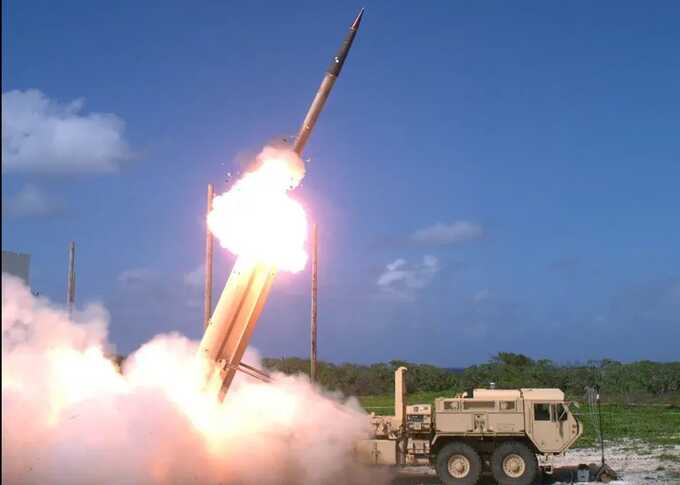What is the American THAAD anti-missile system being sent to Israel?
The United States has sent a new anti-missile system to be operated by American troops on the ground in Israel.
The Terminal High-Altitude Area Defense (THAAD) battery uses both radar and interceptors to stop short, medium and intermediate range ballistic missiles.
It has a range of up to 124 miles and is operated by 95 soldiers, six truck-mounted launchers, 48 interceptors and one radar system and communications centre.
The technology costs between $1billion to $1.8billion USD – seven others have been deployed to areas including South Korea, according to a Congressional Research Service report.
The deployment of THAAD to Israel has raised eyebrows – given it will put US boots on the ground in Israel.

The THAAD missile system is highly advanced (Graphic: Emily Manley)
Why has THAAD been sent to Israel?
THAAD is likely being sent to Israel could be because of two reasons.
The first is a potential attack on Iran from Israel, after the country launched a silo of missiles against Israel earlier this month.
Israel’s prime minister Benjamin Netanyahu warned: ‘Iran made a big error tonight – and it will pay for it. There is also a deliberate and murderous hand behind this attack – it comes from Tehran.
‘We will stand by the rule we established: whoever attacks us – we will attack him.’
Given Israel’s direct ‘rule’ to attack those who attack them, it’s thought they may retaliate against Iran. THAAD could help intercept missiles fired back from Iran if Israel launches an attack.
It could also be to help bridge ‘gaps’ in Israel’s aerial defence. Currently, Israel has three air defence systems, but if faced with another onslaught of missiles, the three may not be able to cope.

Israel currently has three missile defence systems – THAAD could fill a gap (Graphic: Emily Manley)
Could Israel and Iran go to war?
The risk of a direct clash between Israel and Iran, a regional power with nuclear ambitions, has been a recurring theme since the current war in Gaza began 12 months ago.
For years they have been engaged in a shadow war, fought through espionage and proxies.
But that burst into the open when Israel killed senior Iranian military commanders and a Hezbollah member in an airstrike on Damascus, Syria, in April.
Israel has long targeted Iran’s military infrastructure in Syria, used to funnel weapons to Hezbollah, but this was the first time it hit Iran’s embassy there.
Iran responded by launching a wave of 300 drones and missiles, fired from Iran, Iraq and Yemen towards Israel on April 13.
Some 99% were taken out by Israel and its allies, including the UK and US, before Israel retaliated with drones fired at various locations in Iran, including Isfahan, the heart of its nuclear programmes.

Iran has flexed their ballistic missiles before (Picture: Getty)
Earlier this month, it was said Iran is preparing to ‘imminently’ launch ballistic missiles that would reach Israel in 12 minutes, according to a senior US administration official, who warned of ‘severe consequences’.
The source, who spoke on condition of anonymity, said the US was actively supporting Israeli defensive preparations.
Prime Minister Netanyahu urged Russian President Vladimir Putin to wield his influence on allies in Iran to stop the predicted attack.
Israel’s own allies have spent months urging restraint – both in Gaza, where more than 40,000 people have been killed, and in Lebanon – to little effect.
Analysts earlier downplayed the impact of any Iranian retaliation, including drone and missile strikes on Israel or the assassination of Israeli officials.
‘Iran will likely not be able to intervene in the ongoing conflict between Israel and Hezbollah in a way that meaningfully impacts the outcome of the conflict’, the Institute for the Study of War said.
It added: ‘These actions would likely also fail to meaningfully disrupt current Israeli operations in Lebanon.’
Read more similar news:
Comments:
comments powered by Disqus


































